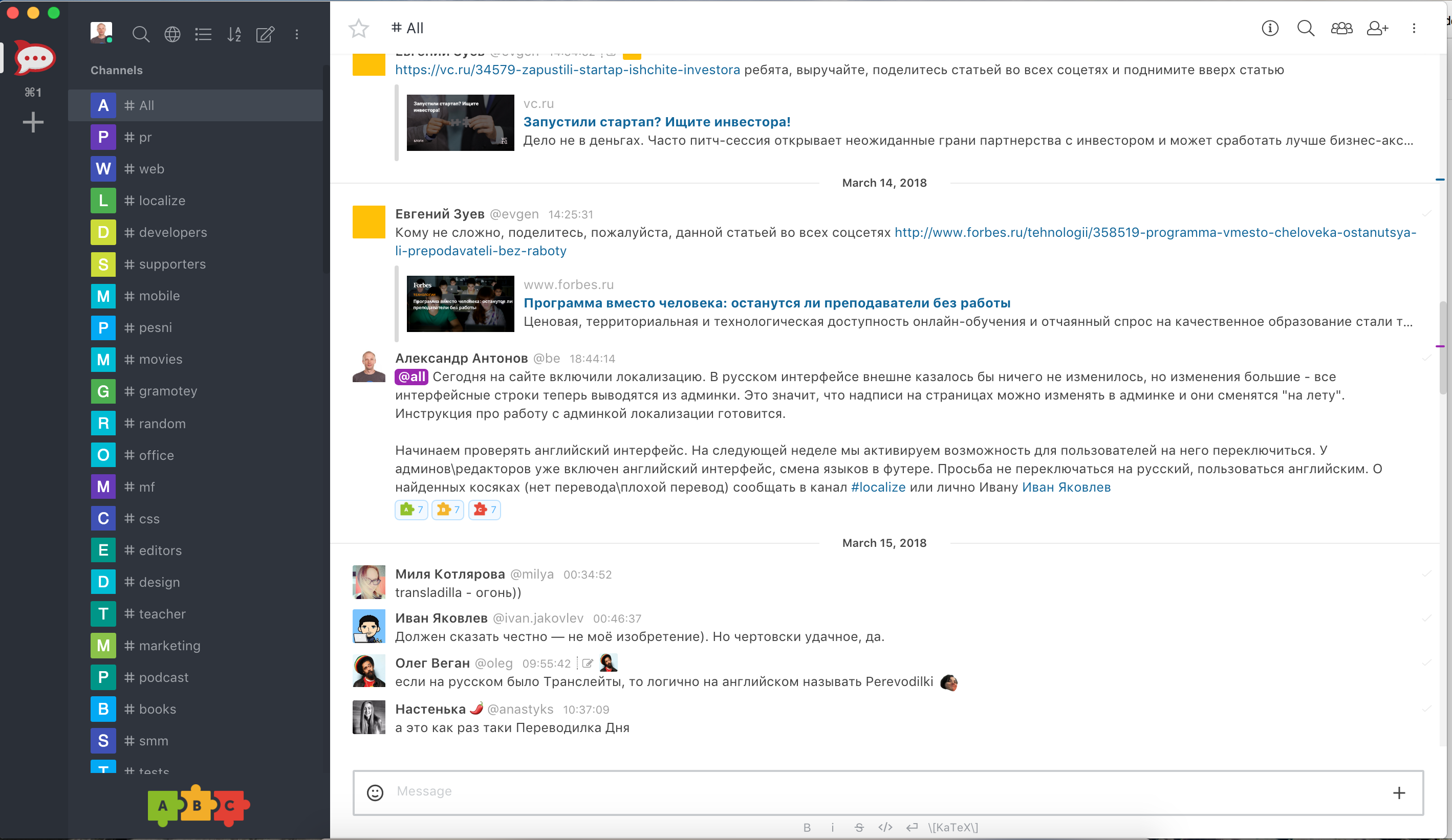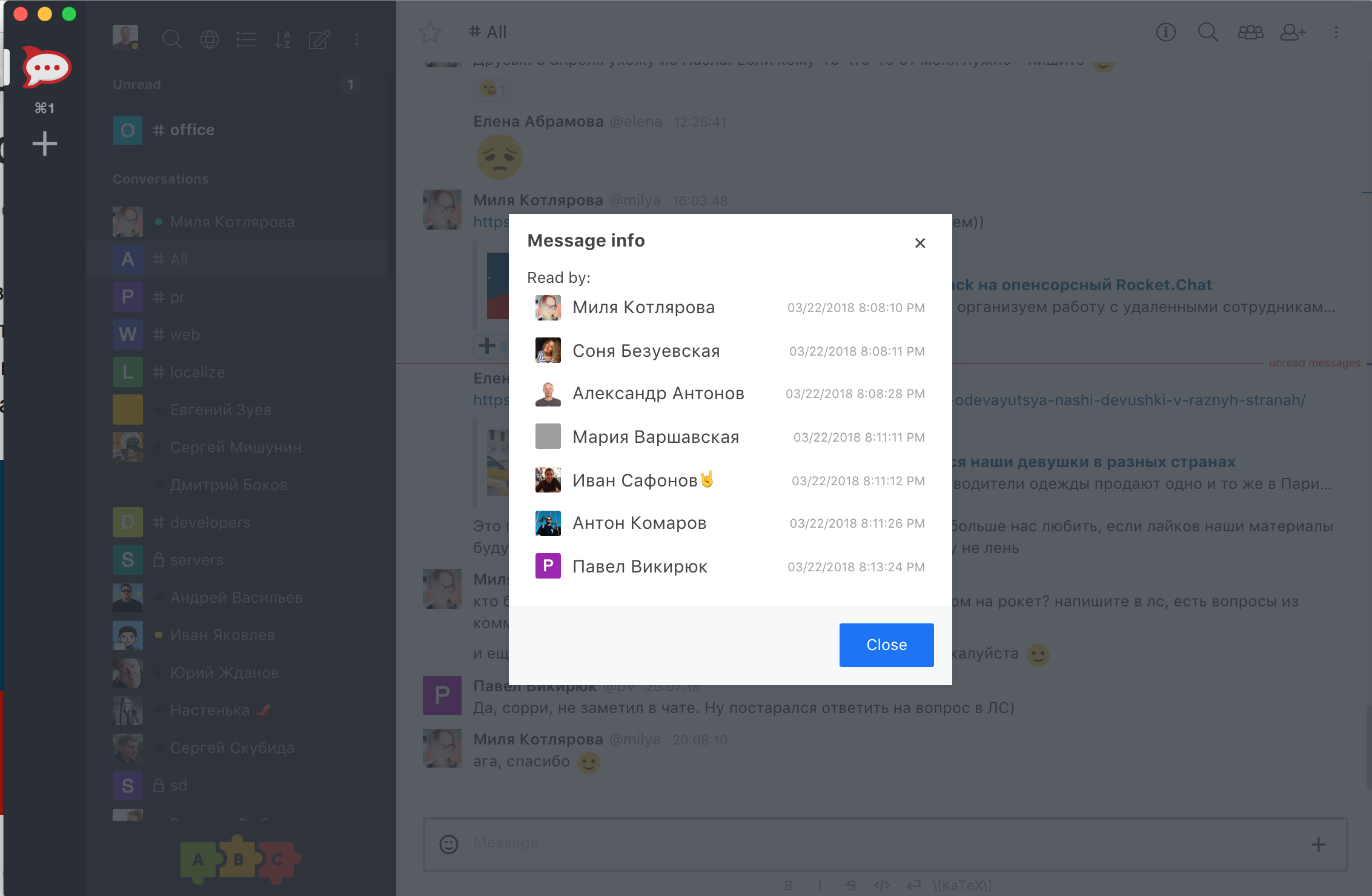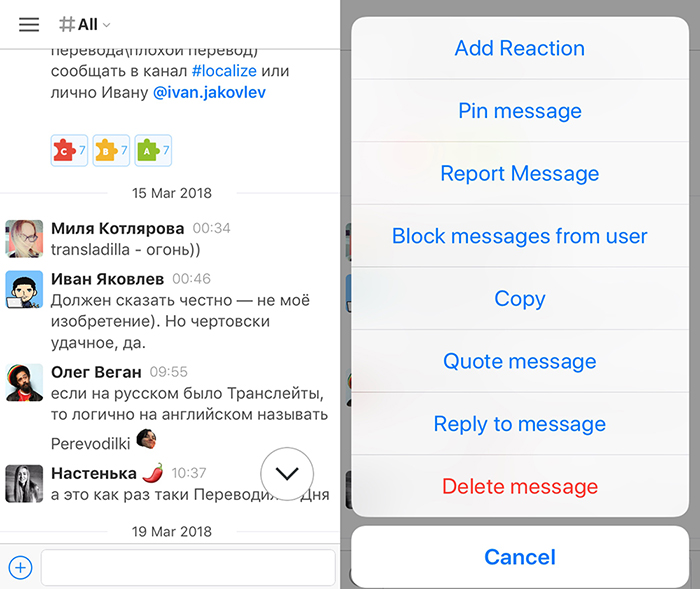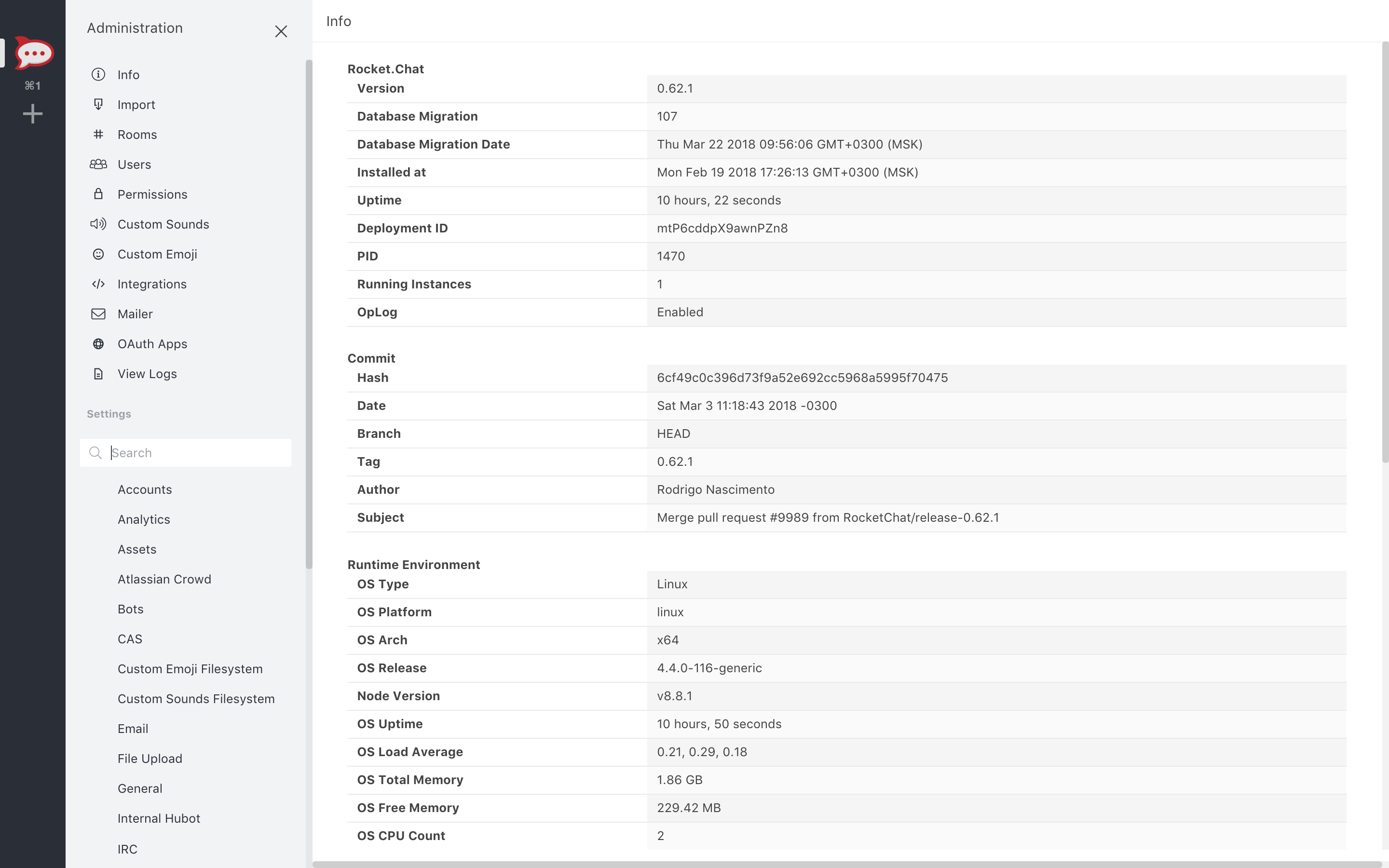How we changed paid Slack to open-source Rocket.Chat
Recently, we wrote about how we organize work with remote employees, and mentioned the well-known Slack messenger. Almost immediately after the publication of the article, we found it still not a very perfect analogue, which promises to be the best among the working messengers in the next couple of years. Today we will tell why we think so.

Our relationship with messengers is complicated. At first, we all communicated in Skype - it was inconvenient (especially from mobile), cumbersome and, frankly, very buggy. Despite these shortcomings, we spent more than 3 years on Skype, after which we thought about changing the platform - the number of employees grew, personal contacts began to intermix with the workers, and Skype did not become more stable.
We immediately chose Slack : we wrote a lot about it then, it seemed comfortable and easily customizable for our needs. The interface is intuitive, there is nothing superfluous, occasionally bugs come out. The only, but very fat, minus is a very high price for storing history and files (when we compared prices, the cost of adding one user was $ 8). Yes, if we had used Slack 100%, it would not have been a problem to pay, but in our case, we needed, in fact, an ordinary convenient messenger.
')
Nevertheless, we used it for a long time - about a year. With a constant increase in the number of employees, the volume of correspondence is growing exponentially, and the limitations of the free version - 10 thousand messages - are becoming increasingly critical: when 30 employees communicate, the story disappears after 5-6 days, and each time save important information somewhere in separate notes are simply unrealistic. At the same time, the cost of the paid version will constantly increase in proportion to the growing number of employees.
We again thought about changing the platform. Global testing began: we went through all possible options, tried at least 20 different applications. Some installed and immediately removed, realizing that they are not suitable, others tested a week. Among them - Stride , Flock , Hangouts, Yandex.Yamb , even Telegram. Some had a curved interface, others had a bug on a bug, and others were paid and, like Slack, did not offer the perfect solution for us. The telegram did not come due to the fact that many employees already used it, and it was inconvenient to interfere with personal and working correspondence - everything was simply lost in one continuous stream.
We chose messengers according to our own criteria up to the presence of reactions to messages, (the employees are already used to them in Slak, besides, they significantly speed up communication) and familiar design, therefore, what was important for us may be completely unprincipled for others. . Here, perhaps, it is worth choosing first by external criteria, whether you need an open-source project or not, what functions are necessary first of all, whether the design is convenient, and then test the platform at work and choose this or that solution based on personal experience.
And most recently, we have found, it seems, the optimal messenger - Rocket.Chat . The history of its introduction is interesting: back in November 2017, when we first saw it in the list of Slack analogues, Rocket was completely raw and unusable, we did not even consider it as a working version. And by January 2018, the developers rolled out an update, in which many bugs were fixed, they changed the design, they added a lot of cool chips like information about who read the message from the chat. In general, then we paid close attention to it and started testing.

Here is a window with information about reading the message:

This is the mobile client:

What attracted us:
The screenshot shows system information:

Actually, one of the drawbacks is a large number of bugs, which, however, are not critical for work. With each update of the application they become smaller, besides, we installed it on our server, and we have more flexibility.
After a week of open testing by all the staff of the Puzzle, we decided to finally stop at it. By the way, all the saved (last) messages from Slack were transferred to our server.
If you are looking for a working application for communication within the team, we highly recommend you to pay attention to Rocket.Chat. Do not repeat our mistakes, do not waste time on crooked messengers! And write in the comments which platform you are using - perhaps we missed something.
Readers of the blog give a coupon for 700 rubles for the purchase of a subscription, which includes 8 types of training and weekly newsletters about English grammar and vocabulary.
And for unlimited and perpetual access to all features of the site there is an “All Inclusive” tariff (the discount does not apply).

Our relationship with messengers is complicated. At first, we all communicated in Skype - it was inconvenient (especially from mobile), cumbersome and, frankly, very buggy. Despite these shortcomings, we spent more than 3 years on Skype, after which we thought about changing the platform - the number of employees grew, personal contacts began to intermix with the workers, and Skype did not become more stable.
We immediately chose Slack : we wrote a lot about it then, it seemed comfortable and easily customizable for our needs. The interface is intuitive, there is nothing superfluous, occasionally bugs come out. The only, but very fat, minus is a very high price for storing history and files (when we compared prices, the cost of adding one user was $ 8). Yes, if we had used Slack 100%, it would not have been a problem to pay, but in our case, we needed, in fact, an ordinary convenient messenger.
')
Nevertheless, we used it for a long time - about a year. With a constant increase in the number of employees, the volume of correspondence is growing exponentially, and the limitations of the free version - 10 thousand messages - are becoming increasingly critical: when 30 employees communicate, the story disappears after 5-6 days, and each time save important information somewhere in separate notes are simply unrealistic. At the same time, the cost of the paid version will constantly increase in proportion to the growing number of employees.
We again thought about changing the platform. Global testing began: we went through all possible options, tried at least 20 different applications. Some installed and immediately removed, realizing that they are not suitable, others tested a week. Among them - Stride , Flock , Hangouts, Yandex.Yamb , even Telegram. Some had a curved interface, others had a bug on a bug, and others were paid and, like Slack, did not offer the perfect solution for us. The telegram did not come due to the fact that many employees already used it, and it was inconvenient to interfere with personal and working correspondence - everything was simply lost in one continuous stream.
We chose messengers according to our own criteria up to the presence of reactions to messages, (the employees are already used to them in Slak, besides, they significantly speed up communication) and familiar design, therefore, what was important for us may be completely unprincipled for others. . Here, perhaps, it is worth choosing first by external criteria, whether you need an open-source project or not, what functions are necessary first of all, whether the design is convenient, and then test the platform at work and choose this or that solution based on personal experience.
And most recently, we have found, it seems, the optimal messenger - Rocket.Chat . The history of its introduction is interesting: back in November 2017, when we first saw it in the list of Slack analogues, Rocket was completely raw and unusable, we did not even consider it as a working version. And by January 2018, the developers rolled out an update, in which many bugs were fixed, they changed the design, they added a lot of cool chips like information about who read the message from the chat. In general, then we paid close attention to it and started testing.

Here is a window with information about reading the message:

This is the mobile client:

What attracted us:
- Rocket.Chat is an open source project. You can fix bugs, contribute, follow the development;
- If you put Rocket.Chat on your server, you can, first, use it for free, and second, fully adapt it to your needs. But the paid version is quite inexpensive, billing for Rocket.Chat is “flat”, as opposed to Slak and its counterparts - $ 50 per month with a number of employees no more than 500. Until such a number of employees, we have to grow for a long time;
- Rocket integrates with many applications needed for work, for example, for video conferencing;
- The project is developing very quickly, so you can put up with the existing shortcomings - we know that they will be quickly corrected.
The screenshot shows system information:

Actually, one of the drawbacks is a large number of bugs, which, however, are not critical for work. With each update of the application they become smaller, besides, we installed it on our server, and we have more flexibility.
After a week of open testing by all the staff of the Puzzle, we decided to finally stop at it. By the way, all the saved (last) messages from Slack were transferred to our server.
If you are looking for a working application for communication within the team, we highly recommend you to pay attention to Rocket.Chat. Do not repeat our mistakes, do not waste time on crooked messengers! And write in the comments which platform you are using - perhaps we missed something.
If you want to upgrade English, come to us
Readers of the blog give a coupon for 700 rubles for the purchase of a subscription, which includes 8 types of training and weekly newsletters about English grammar and vocabulary.
And for unlimited and perpetual access to all features of the site there is an “All Inclusive” tariff (the discount does not apply).
Source: https://habr.com/ru/post/351768/
All Articles